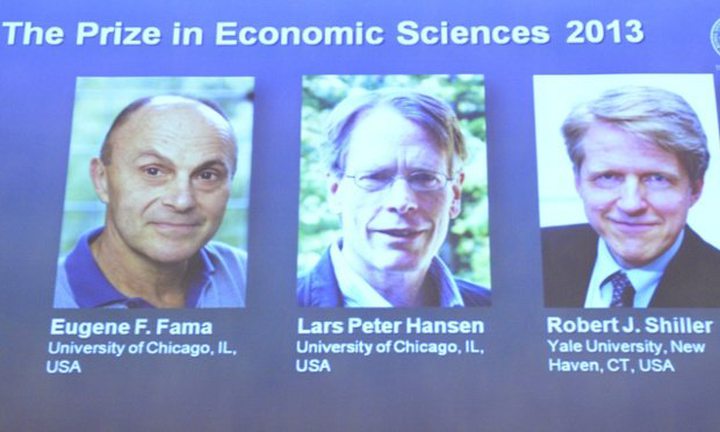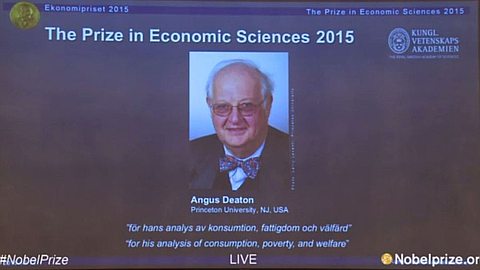Fama, Shiller, Hansen Win Nobel Prize for Asset-Price Work

The three economists, all Americans, “laid the foundation for the current understanding of asset prices,” the Royal Swedish Academy of Sciences, which selects the winner, said today in Stockholm. “It relies in part on fluctuations in risk and risk attitudes, and in part on behavioral biases and market frictions.”
Their work spans almost 50 years of research, beginning with the finding by the University of Chicago’s Fama that it’s difficult to predict price movements in the short run. That conclusion forms the basis for the theory that financial markets are efficient and led to the development of stock-index funds.
Later papers by Shiller and the University of Chicago’s Hansen focused on longer-run price swings and the extent to which they could be explained by such fundamental features as dividend payouts on stocks and the risk appetite of investors.Yale University’s Shiller, in particular, took issue with the argument that investors are always logical, using the phrase “irrational exuberance” to explain run-ups in asset prices.
The winners represent a “very interesting collection because Fama is the founder of the efficient-market theory and Shiller at least is one of the critics of it,” said Robert Solow, winner of the Nobel economics prize in 1987 and professor emeritus at theMassachusetts Institute of Technology in Cambridge.
Yankees-Red Sox
“It’s like giving a prize to the Yankees and the Red Sox,” he said, comparing the competing theories to the rivalry between the New York and Boston baseball teams. “What it suggests is there really isn’t a settled doctrine” in finance.
The award comes five years after a financial crisis that drove the U.S. and world economies into their deepest recession since the Great Depression.
Fama, 74, has dismissed criticism that the turmoil undercut his thesis that markets are efficient, arguing that it was triggered by developments in the economy, including a fall in house prices and the onset of a recession.
In the mid-1960s, he propounded theories arguing that stock-price movements are unpredictable and follow a “random walk,” making it impossible for any investor, even a professional, to gain an advantage. He also showed in later work that so-called value and small-cap stocks have higher returns than growth stocks, and he rejected the notion that markets often produced bubbles.
Beating Market
“Fama’s research at the end of the 1960s and the beginning of the 1970s showed how incredibly difficult it is to beat the market, and how incredibly difficult it is to predict how share prices will develop in a day’s or a week’s time,” said Peter Englund, professor in banking at the Stockholm School of Economics and secretary of the committee that awards the Nobel Prize in Economic Sciences. “That shows that there is no point for the common person to get involved in share analysis. It’s much better to invest in a broadly composed portfolio of shares.”
Fama said he learned of the award while preparing for a class on portfolio theory and asset pricing. A native of Boston, Fama earned a bachelor of arts degree at Tufts University in Medford, Massachusetts, in 1960, and went on to the University of Chicago, where he received a master of business administration degree in 1963 and a doctorate in 1964.
Housing Bubbles
Since 1981, Shiller has been at the vanguard of economists chipping away at the theory of efficient markets. His research showed that investors can be irrational and that assets from stocks to housing can develop into bubbles.
“Shiller found that stock prices were bad ‘weathermen,’” said Nobel laureate George Akerlof, an economics professor at the University of California at Berkeley and husband of Janet Yellen, President Barack Obama’s nominee to be Federal Reserve chairman. “Historically, they have been much more variable than the current value of the dividend streams.
“From this evidence, he concluded that rational models of the stock market, in which stock prices reflect rational expectations of future payouts, are in error. This clever combination of logic, statistics, and data implies that stock markets are, instead, prone to irrational exuberance.”
Phone Call
Born in Detroit in 1946, Shiller earned his Ph.D. in economics from the Massachusetts Institute of Technology in 1972. He told reporters that he learned of the award while “getting out of the shower this morning. I wasn’t properly dressed, but I didn’t want to miss the phone call.”
Shiller said the 2008 financial crisis “reflected mistakes and imperfections in our financial system that we are already working on correcting. I think there’s much more to be done. I think it will take decades. But we’ve been through financial crises many times in history and we generally learn from them.”
The study of housing prices has been a long-standing interest of Shiller’s. Dissatisfied with existing data, he and Karl Case created the S&P/Case-Shiller home price indexes. These captured U.S. home prices doubling from 2000 to mid-2006, then plunging 35 percent amid the worst financial crisis since the Great Depression.
“Shiller’s research showed episodes when assets were overvalued,” said Englund. When information technology shares rose in the 1990s, Shiller argued “that this is not sustainable in the long-term, which he was right about,” Englund said. “He also warned for many years about a housing bubble in the U.S. He was right there too.”
Dynamic Models
Hansen, 60, is one of the co-founders of the Becker Friedman Institute at the University of Chicago, which builds on the legacy of Milton Friedman.
His work explores the implications of dynamic economic models in which decision makers face uncertain environments. He is perhaps best known as the developer of a statistical technique called the generalized method of moments, which broadens the assumptions that researchers can count on, allowing them to focus on other suppositions and linkages in their work.
“The choice of having Hansen complement the two extremes of efficient markets and inefficient markets is the perfect balance between the two,” said Andrew Lo, a professor finance at MIT’s Sloan School of Management.
Hansen’s development of econometric techniques for analyzing data and asset prices allows economists to test the various theories on what drives markets, he said.
‘True Giant’
“Lars is a true giant in both economics and finance,” Federal Reserve Bank of Minneapolis President Narayana Kocherlakota said in an e-mail. Hansen was Kocherlakota’s Ph.D. adviser at the University of Chicago.
Hansen’s “remarkably general empirical methods free researchers from the need to make a range of empirically implausible statistical assumptions about the data that they are studying,” Kocherlakota added. “By doing so, Lars’s methods allow economists to assess the core economic implications of their models and theories relative to the data of interest.”
Born in Champaign, Illinois, Hansen received his Ph.D. in economics at the University of Minnesota in 1978 and his bachelor’s degree in mathematics and political science from Utah State University, Logan, Utah. Hansen told reporters that he learned of the award after walking his dog and while getting ready to go out and exercise with his personal trainer.
Shows Irony
Lo said the Nobel committee’s decision in giving the award to Fama and Shiller “definitely shows a certain flair for irony.” The message, he added is that “financial markets can be efficient most of the time but every once in a while they break down and then we need to develop better analytics to be able to understand them.”
James Poterba, president of the National Bureau of Economic Research, which is responsible for dating the beginnings and endings of recessions, praised the committee for recognizing the work being done in the finance field “without waiting in some sense for the complete resolution of these different views.”
“It may be a long time before we get there,” said Poterba, who is also a professor of economics at MIT.
The Nobel economics prize has in the past helped laureates achieve recognition for their theories outside academic circles, often bringing them closer to policy making. Past winners include Paul Krugman, Amartya Sen and James Tobin.
First Woman
Last year’s prize was awarded to U.S. economists Alvin E. Roth and Lloyd S. Shapley for their exploration of how to make markets work more efficiently by better matching supply with demand. In 2009, Elinor Ostrom became the first woman to win when she received the prize together with Oliver Williamson for investigating the limits of markets and how organizations work.
Annual prizes for achievements in physics, chemistry, medicine, peace and literature were established in the will of Alfred Nobel, the Swedish inventor of dynamite who died in 1896, and the first prizes were handed out in 1901. The economics award was set up by Sweden’s central bank in 1968.
The official name is The Sveriges Riksbank Prize in Economic Sciences in Memory of Alfred Nobel. The money, 8 million kronor ($1.2 million), a gold medal and a diploma, will be presented to the laureates at a ceremony in Stockholm on Dec. 10, the anniversary of Nobel’s death.
Today’s announcement of the economics prize marks the final award for this year.





